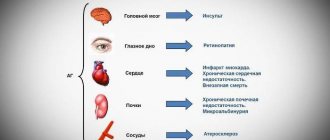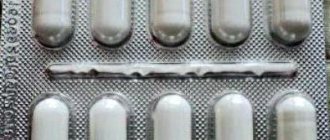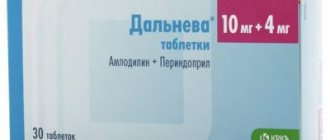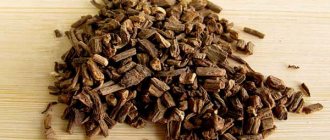Description of the drug EDARBI
When taken orally, Cmax of azilsartan in blood plasma is achieved on average within 1.5-3 hours. The absolute bioavailability of azilsartan medoxomil is approximately 60%. Food intake does not affect the bioavailability of azilsartan.
After single or multiple oral administration in a dose range from 20 mg to 320 mg, the pharmacokinetics of azilsartan medoxomil are dose proportional.
Vd of azilsartan is about 16 l. Plasma protein binding is more than 99%, mainly with albumin. Plasma protein binding remains constant when azilsartan plasma concentrations are significantly higher than the range achieved when taken at recommended doses. Css of azilsartan is achieved within 5 days; its accumulation in the blood plasma does not occur with daily use once a day.
Animal studies with radioactive tracers have shown that the amount of azilsartan that penetrates the BBB is minimal.
After oral administration during absorption from the gastrointestinal tract, azilsartan medoxomil is converted into the pharmacologically active metabolite azilsartan under the action of the enzyme carboxymethylenebutenolidase in the intestines and liver. Azilsartan is metabolized to two primary metabolites primarily in the liver. The main metabolite in blood plasma is formed by O-dealkylation, the minor metabolite by decarboxylation. The AUC values for these metabolites in humans are respectively 50% and less than 1% compared to azilsartan. These metabolites do not affect pharmacological activity. Metabolism of azilsartan occurs mainly with the participation of the CYP2C9 isoenzyme.
Azilsartan and its metabolites are excreted from the body, both through the intestines and the kidneys. Studies have shown that after oral administration of azilsartan medoxomil, about 55% (mainly as a minor metabolite) is found in the feces and about 42% (15% as azilsartan, 19% as the main metabolite) in the urine. T1/2 of azilsartan is about 11 hours, renal clearance is about 2.3 ml/min.
In patients with mild, moderate and severe renal impairment, AUC was increased by 30%, 25% and 95%, respectively. No increase in AUC (5%) was observed in patients with end-stage renal disease on hemodialysis. Clinical data on pharmacokinetics in patients with severe or end-stage renal failure are not available. Azilsartan is not removed from the systemic circulation by hemodialysis.
Use of azilsartan medoxomil for more than 5 days in patients with mild (Child-Pugh class A) or moderate (Child-Pugh class B) hepatic impairment leads to a slight increase in AUC (1.3-1.6 times, respectively). Pharmacokinetics in patients with severe (Child-Pugh class C) hepatic impairment has not been studied.
Compatibility of Edarbi and alcohol
? The effect of alcohol on blood pressure is not the same and depends on the volume drunk - in small quantities it dilates the arteries and the pressure drops, but when ethanol enters the body in large volumes it increases. Despite the fact that the drug is intended to combat hypertension, it should not be taken together with alcohol.
Almost all types of alcoholic beverages, weak and strong, can affect the medication: wine, beer, vodka, other strong drinks with a high alcohol content, champagne, etc.
To do this, it is enough to drink very little: 350-250 ml of beer, 100-150 ml of wine, 50 ml of vodka. This amount of alcohol is calculated for a person with an average weight of 60 kg.
Consequences of drinking alcohol
When taking the drug together with ethanol, there is a noticeable increase in the load on the liver and kidneys - organs that are busy processing and then removing the intoxicating substance from the body.
There is a load on the heart - the heart rhythm may be disturbed, tachycardia, bradycardia may develop, symptoms of acute heart failure may appear, and there is a risk of stroke and heart attack.
For this reason, you should not drink alcohol and medication together, the compatibility of which will affect internal organs.
If symptoms of disturbances are detected, you need to stop drinking alcohol and drink more fluid for at least 4 hours to restore its balance in the body. This will help improve the condition. If there is no improvement, it is recommended to consult a doctor.
Use of the drug for alcoholism
Constant drinking of alcohol creates the preconditions for the development of hypertension, as alcohol increases blood pressure. If you drink alcoholic beverages regularly, almost every day, as happens with alcoholism, then your blood pressure will almost always be elevated because it will not have time to decrease to normal levels.
Ethanol increases blood pressure if it was elevated before taking it, as well as if it was normal.
It has been established that ethanol reduces the effectiveness of medications aimed at treating hypertension, therefore, if you simultaneously take the drug while regularly drinking alcohol, you should not expect an immediate antihypertensive drug effect from the drug.
In alcoholism, internal organs suffer from the destructive effects of ethanol, primarily the liver and kidneys. In case of severe disorders of these organs (which is often observed in people suffering from alcoholism), as written in the instructions for the medication, taking the medication is prohibited.
Using the drug for a hangover
Side effects include:
- dizziness;
- nausea;
- diarrhea;
- muscle spasms;
- vomit;
- the occurrence of angioedema;
- severe fatigue;
- excessive decrease in blood pressure, hypotension.
Drinking alcohol causes the same consequences, that is, if you take pills during a hangover, the unpleasant symptoms may intensify. To avoid deterioration of the general condition, it is recommended to refrain from taking the drug until the body returns to normal or reduce its dose.
Edarby and beer
It is forbidden to take Edarbi with beer, because pressure surges caused by this tandem significantly worsen the condition of the sick patient.
By mixing two substances, the toxic load on the liver, and subsequently on the kidneys, greatly increases. The fact is that the filtering organ’s priority is purification from ethanol, as a result of which the drug gradually accumulates in the tissues, causing an overdose or intoxication.
As a result, the heart rhythm may be disturbed, tachycardia, bradycardia, symptoms of acute heart failure appear, and the risk of stroke and heart attack increases.
Release form and composition
Dosage form of Edarbi - tablets: from almost white to white, round biconvex shape, on one side engraved “20”, “40” or “80” (depending on the dosage), on the other - “ASL” (in a cardboard pack 1- 4 or 7 aluminum blisters of 14 tablets).
Composition of 1 tablet:
- active substance: azilsartan medoxomil – 20, 40 or 80 mg (azilsartan potassium medoxomil – 21.34; 42.68 or 85.36 mg);
- auxiliary components (20/40/80 mg): magnesium stearate – 0.9/1.8/3.6 mg; mannitol – 47.815/95.63/191.26 mg; hyprolose – 2.7/5.4/10.8 mg; fumaric acid – 1/2/4 mg; sodium hydroxide – 0.345/0.69/1.38 mg; microcrystalline cellulose – 9/18/36 mg; croscarmellose sodium – 6.9/13.8/27.6 mg.
When can you drink alcohol if you are taking or have taken the drug?
During treatment with the drug for hypertension, diseases associated with increased blood pressure, the duration of which is on average 4 weeks, you should not drink any alcoholic beverages.
After completing therapy, at least 2 weeks must pass before you can drink alcohol. The medication, as well as ethanol, is prohibited for women during pregnancy at any stage.
After a single dose of tablets, the therapeutic effect is achieved within a few hours and lasts for 24 hours. To avoid unpleasant consequences, after taking the pill, at least 24 hours should pass before drinking alcohol (for men). Women need to wait even longer - 32 hours.
This blood pressure reducer and ethanol do not mix. Taken together, without taking into account the rules of use, they can cause increased side effects in the human body; the load on the liver and kidneys can significantly increase, especially if they are affected by the disease. An already unimportant condition may worsen due to a hangover.
Top 10 drugs incompatible with alcohol
Why paracetamol, ibuprofen and antigrippin require an exclusively sober lifestyle
It has long been known that alcoholic beverages are not friendly with many medications. But information about which drugs should not be combined with alcohol “in the same glass” is often contradictory and confusing. As part of self-education and preparation for the “generous” Russian holidays - New Year and Christmas - we will fill the gaps in knowledge and determine the list of the most common medications that require an exclusively sober lifestyle.
Let’s say right away that “combining” does not mean washing down the drug with a glass of champagne or wine. The half-life of drugs can reach 10–12 hours, so when you take the medicine in the morning and “on the chest” in the evening, you also combine it with alcohol.
Paracetamol
Few people know that one of the most popular antipyretic and painkillers can be dangerous if combined with alcoholic beverages. In the presence of alcohol, paracetamol is metabolized in the body to form toxic substances that can cause liver damage. The danger is greatest if you combine long-term alcohol intake (for example, 90 ml of vodka or more per day for several days) with high doses of paracetamol (3000 mg or more).
Antiallergic and anti-cold medications
Alcohol consumed on the same day with some antihistamines, including the popular cetirizine and loratadine, increases the effects of the drugs on the central nervous system. This is manifested by increased drowsiness, lethargy and decreased motor activity. It should be borne in mind that many combined anti-cold medications include antiallergic components and, by the way, paracetamol.
Read also: Antibiotics and alcohol: consequences
Be sure to give up alcohol if you are taking Antigrippin (paracetamol + chlorphenamine + ascorbic acid), AntiFlu or Coldact Flu Plus (paracetamol + phenylephrine + chlorphenamine).
Nonsteroidal anti-inflammatory drugs
They are popular and sometimes almost irreplaceable. Ibuprofen, ketoprofen, naproxen, diclofenac and other NSAIDs are taken for toothaches, headaches, severe arthritis or muscle inflammation. And often consumers do not suspect that alcohol taken during treatment with NSAIDs greatly increases the risk of gastrointestinal bleeding. Let me remind you that drugs in this group are already not very friendly to the digestive tract and can cause gastropathy - stomach diseases. Alcohol can turn NSAIDs into aggressive substances that threaten real disaster.
Alcohol and blood pressure medications - is it dangerous to mix?
An increase or decrease in blood pressure can be caused by many reasons - overwork, stress, temperature changes, magnetic storms, alcohol consumption. In the case of alcohol, the change in pressure occurs due to a sharp dilation of blood vessels.
The main danger of mixing alcohol and drugs
Blood pressure medications will help bring blood pressure into order in case of normal high blood pressure or chronic hypertension. But there is an important question: is it possible to take such drugs if your blood pressure has jumped after drinking alcohol? Situations also arise when the pill has already been taken: can you drink alcohol after that or not? Medicines for hypertension and alcohol have the same effect on the blood vessels of the body - when taken simultaneously, the effect of one component enhances the effect of the other.
Alcohol for hypertension increases the effect of the pills - but not the positive effect of the drug, but its side effects. The ethanol contained in alcoholic beverages is to blame for this, as it increases the toxicity of any medicine. Depending on the body's adverse reactions to blood pressure pills, their compatibility with alcohol can lead to serious or fatal consequences. Hypertensive drugs are divided into several classes with a specific principle of action and composition. Alcohol affects drugs in each class differently.
What specific problems will arise when mixing alcohol and medication? It all depends on the class of the hypertensive drug and the side effects related to the specific class:
Our readers successfully use Normaten to treat HYPERTENSION. Seeing how popular this product is, we decided to bring it to your attention. Read more here...
- Diuretics (Torasemide, Bumetonide, Priretanide). A class of diuretics that helps blood vessels constrict by removing fluid. With a mild degree of toxicity, dizziness, dry mouth, and lethargy will appear. In more severe cases, tachycardia may develop.
- Beta blockers (Atram, Acridilol, Carvidil). Reduce heart rate, returning blood pressure to normal. An increase in the effect of blockers leads to severe contraction of blood vessels or complete loss of pulse.
These side effects on the body are enhanced when taken simultaneously with alcoholic beverages, so doctors and specialists urge you to avoid such mixing.
High blood pressure due to alcohol - what to do?
Strong alcohol and anti-hypertension pills should not be mixed, as this will most likely lead to undesirable consequences. How to normalize blood pressure after drinking alcohol? There are several solutions - their choice is determined by the degree of pressure increase.
When blood pressure increases by 20–25% of the original level, doctors advise using magnesium sulfate. This substance is safe for the body, but is ineffective in severe conditions. It is taken orally in the form of a suspension or administered intravenously by preparing a special solution. Magnesium will also combat hangovers and general toxicity of the body, which is why it is considered a universal cure for alcohol poisoning. The closest analogue of magnesium sulfate is Furosemide, a special antihypertensive drug that can be combined with alcohol as much as possible.
To normalize blood pressure after drinking alcohol, it is not necessary to use chemicals and pills. For a slight increase, home remedies are suitable - herbal preparations, juice or pulp of certain vegetables, prepared according to special recipes. Natural products contain many active substances that are beneficial to the body, easily digestible and do not cause allergic reactions.



